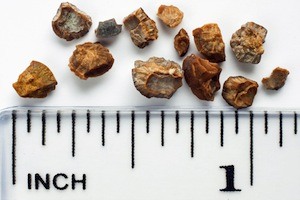
Ask anyone who's had a kidney stone what it's like and they'll tell you a horrific tale of pain and agony. Kidney stones, which are jagged mineral deposits, form in the kidneys and pass through the urinary tract. Sound awful? It is. While there's no way to be immune to developing kidney stones, there are steps you can take to discourage their formation. Let's take a look at what kidney stones are, why they form, and what you can do to reduce your chances of developing them.
What Causes Kidney Stones?
There are a few factors that can cause kidney stones; one of the most common is excess calcium. [1] While calcium is a nutrient your body needs, if you get too much or your body's processing systems are imbalanced, calcium can accumulate in the kidneys and bind with phosphates and oxalates to develop stones. Other causes of kidney stones include acidic urine, kidney infections, and genetic predisposition. People who've had kidney stones before are more likely to have them again. Secondary factors like obesity, dehydration, and medications may also encourage kidney stones to form. [2]
Why Are Stones Painful?
Sometimes compared to childbirth, kidney stones can be one of life's most painful experiences. The level of discomfort is proportionate to the size of the stone. Small stones may form and pass through the urinary tract almost without notice. Larger stones, however, are a different story. With a shape like jagged, broken glass, every fraction of a millimeter they pass through the urinary tract can be excruciating.
How Are Kidney Stones Diagnosed?
Back pain, pain while urinating, and blood in the urine are some of the more obvious indications of kidney stones. There are formal tests that can assist in a precise determination, however.
- Urinalysis - Fairly simple and non-invasive, a urine sample can detect an infection or substances linked to stone formation.
- Blood Test - Analyzes blood levels of calcium, uric acid, electrolytes, and phosphorus and can detect imbalances that coincide with stone formation. May also provide information on kidney function.
- Imaging - Quite a bit more invasive, but x-rays and CT scans can detect the location and size of a stone, and sometimes the cause for its formation.
Getting Rid of Kidney Stones
Although painful, most stones pass on their own. Some, however, need help. There are a number of home remedies for discouraging kidney stones and several hospital-level procedures. One effective solution, known as shockwave therapy, has become very popular. It's a process in which targeted shockwaves are sent through the body to break up the stones into smaller pieces that pass easier. Interesting side note – using an inversion table is an excellent complement to shockwave therapy.
During another procedure known as a ureteroscopy, a long tube-like tool is inserted through the urethra to break the stones into tiny particles – it's as fun as you might imagine.
Finally, surgery is an option but typically reserved for the most severe cases. During surgery, a urologist inserts a small tool through an incision in the back to remove the stone.
Can Kidney Stones Be Prevented?
There's no sure fire way to prevent kidney stones but there are a few strategies that promote normal function of the kidneys. Maintaining a healthy weight and staying hydrated need to be everyone's foundation. Kidney cleansing, lemon juice, and eating foods that support the kidneys are also a good idea. Additionally, foods high in betaine, a chemical compound found in seafood, quinoa, spinach, and beets, can help fight kidney stones by balancing urine pH. [3]
Although kidney stones contain calcium, calcium in the urine is influenced by other factors, including sodium, potassium, and vitamin D intake. It may be, but it's not necessarily the result of consuming too much dietary calcium. [4] Still, if kidney stones are a recurring concern for you, examining your calcium intake is appropriate.
References (4)
- Coe FL, Evan A, Worcester E. Kidney stone disease. The Journal of Clinical Investigation. 2005 October;115(10):2598-608.
- Malvinder S Parmar. Kidney stones. BMJ: British Medical Journal. June 12, 2005; 328(7453): 1420-1424.
- Frassetto L, Kohlstadt I. Treatment and prevention of kidney stones: an update. American Family Physician. 2011 December 1;84(11):1234-42.
- Trinchieri A. Diet and renal stone formation. Minerva Medica. 2013 February;104(1):41-54.
†Results may vary. Information and statements made are for education purposes and are not intended to replace the advice of your doctor. If you have a severe medical condition or health concern, see your physician.







